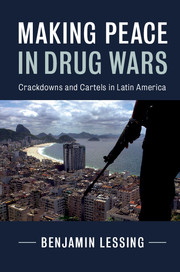Book contents
- Frontmatter
- Dedication
- Contents
- Figures
- Tables
- Preface
- Acknowledgments
- Abbreviations and Acronyms
- 1 Introduction
- PART I A THEORY OF CARTEL–STATE CONFLICT
- PART II CASE STUDIES
- 5 Colombia: Conditionality to Contain a Killer
- 6 Rio de Janeiro: Conditionality, One Favela at a Time
- 7 Mexico: Conditionality Abandoned
- PART III CONDITIONAL REPRESSION AS OUTCOME
- Appendix A Violent-Event Data
- Appendix B List of Interview Subjects
- Bibliography
- Index
- Miscellaneous Endmatter
7 - Mexico: Conditionality Abandoned
from PART II - CASE STUDIES
Published online by Cambridge University Press: 17 November 2017
- Frontmatter
- Dedication
- Contents
- Figures
- Tables
- Preface
- Acknowledgments
- Abbreviations and Acronyms
- 1 Introduction
- PART I A THEORY OF CARTEL–STATE CONFLICT
- PART II CASE STUDIES
- 5 Colombia: Conditionality to Contain a Killer
- 6 Rio de Janeiro: Conditionality, One Favela at a Time
- 7 Mexico: Conditionality Abandoned
- PART III CONDITIONAL REPRESSION AS OUTCOME
- Appendix A Violent-Event Data
- Appendix B List of Interview Subjects
- Bibliography
- Index
- Miscellaneous Endmatter
Summary
Mexico has become known for drug violence, which escalated dramatically from 2006 to 2012, including a ten-fold intensification of cartel-state conflict. However, large DTOs operated peacefully in Mexico for more than a century. Since its advent in the 1930s, the hegemonic Partido Revolucionario Institucional (PRI) actively managed cartels through a highly conditional state-sponsored protection racket. This system began to erode in the late 1980s and eventually collapsed with Mexico's democratization in the 1990s. Though cartels grew stronger from the 1990s onward due to market forces, the triggering factor for cartel–state conflict—and possibly inter-cartel turf war—was shifts in state policy. This chapter makes four key claims: (1) Under single-party PRI rule (1930s–1989), conditionality was high, leading cartels to eschew anti-state violence. (2) Democratization (1990–2000) weakened conditionality, pushing cartels toward violent strategies, though actual anti-state violence remained rare. (3) Fox's limited, unconditional crackdown (2003–2005) pushed cartels to fight back, triggering the onset of cartel–state conflict. (4) Calderón's massive crackdown (2006–2012) severely reduced conditionality, leading to full-blown cartel–state conflict. I also conjecture that attempts to reform policy in a more conditional direction in 2010 and 2011 mostly failed, but modestly increased conditionality in some repressive agencies. This may have induced some cartels to adopt less confrontational strategies. Under Enrique Peña Nieto, state policy seems to have remained largely unconditional, and cartel–state conflict abides.
OVERVIEW
Between December 2006, when President Felipe Calderón led Mexico's armed forces into a “war without quarter” against drug cartels, and the end of his term six years later, some 75,000 lives were lost to cartel-related violence. Mexico's drug war began before Calderón's time in office, and has certainly outlived it. Yet Calderón's crackdown and the explosion of violence that followed it both represent radical breaks with the past. What had been a growing but minor concern at the outset of Calderón's presidency became an enduring crisis of national proportions, altering Mexico's perception in the eyes of the world and its own people. Moreover, Calderón's unconditional, militarized approach was quietly adopted by his successor, Enrique Peña Nieto, despite initial vows to reverse course.
- Type
- Chapter
- Information
- Making Peace in Drug WarsCrackdowns and Cartels in Latin America, pp. 202 - 238Publisher: Cambridge University PressPrint publication year: 2017



